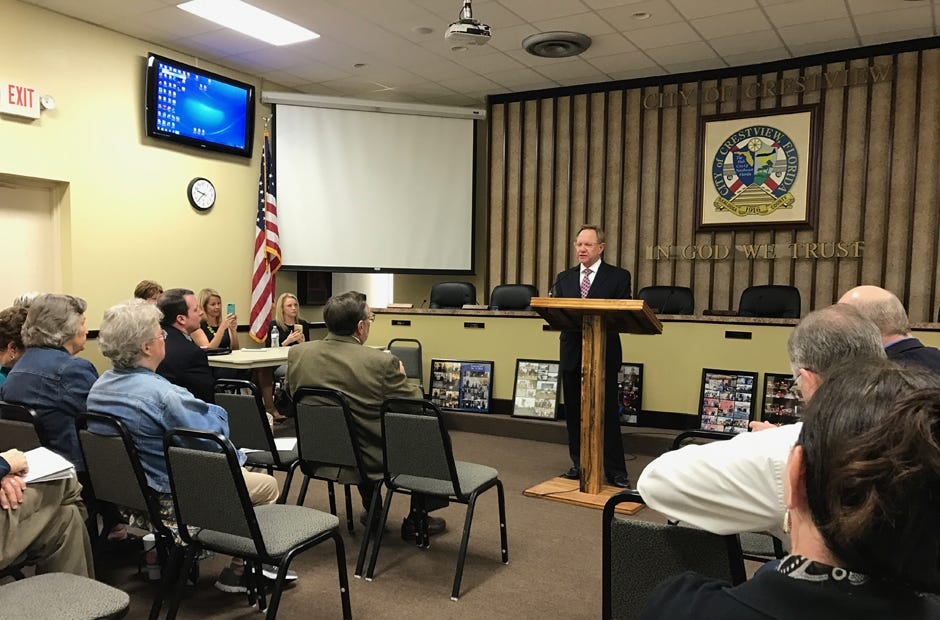CRESTVIEW — Recent Mason-Dixon Polling and Research findings called the city’s government structure into question, sparking debate among city officials.
But the topics of city marketability and luring investors to Crestview were seemingly lost in the shuffle.
“I think they are all related because without an efficient government structure, investors will be hesitant to put their money there,” Quint Studer, investor, businessman and founder of the Studer Community Institute, said during a phone interview.
The institute works to improve the quality of life for Pensacola area residents, but recently turned its attention toward Crestview.
The city needs to establish a central mission and identify priority areas for its quality of life before it can begin garnering investors’ attention, Studer said in a January speech to the Crestview City Council.
Studer believes this is still a vital step and requires insight from Crestview residents at a time when the city is debating if it will complete the Mason-Dixon research.
One of the next steps in that research is a “quality of life” survey sent to residents. Its findings could help in creation of a metric to measure the city’s most important factors to quality of life.
Establishing priorities will be difficult for the city without this insight, Studer said. The task of tackling all problems becomes challenging without these established priorities as points of focus, he added.
“It’s important to figure out what residents are saying,” Studer said. “I still think they need to [complete the study].”
“The city needs benchmarks and the ability to know where they want to go with them,” Community Redevelopment Agency Director Brenda Smith said in a phone interview, agreeing with Studer’s position. Smith and the CRA were responsible for bringing Studer and Mason-Dixon Polling and Research to the city.
Studer stands by the research and supports the city moving to a council-manager structure of government to streamline growth, he said. This would also allow the government to work more effectively toward achieving goals, according to Studer.
A manager focuses on the day-to-day issues of running the city, such as administrative tasks, coordinating between department directors, developing an annual budget and educating elected officials.
“Larry [Harris of Mason-Dixon] had many concerns that the city was at risk and those had to be addressed before surveying people,” Smith said in response to how a potential shake-up would affect Crestview’s intent to lure investors.
The city is being forced into rapidly accepting outside changes, City Attorney Ben Holley said after hearing the findings and recommendations from the Mason-Dixon research.
“They can slow down,” Studer said in regard to this response. “But what’s the right amount of time to give yourself? If you take too long, you end up just where you started at.”
Crestview might explore conducting its own resident survey, according to a conversation with Mayor David Cadle.
Smith expressed concern that such a study would not be independent and questioned who would manage and write the survey.
“What are they going to be measuring?” Smith said. “If it’s not done properly you’ll just get people saying they aren’t happy in general or don’t like the park or something.”
Regardless of who conducts the next phase, economic development and business growth could be hindered if a citizen survey isn’t conducted and quality of life focal points aren’t established at all.
Instituting these changes without a restructuring of government, as Studer said, would make it difficult to meet goals.
Studer still expressed interest and hope in Crestview but cautions about slowing the process of research and reform implementation too much.
Smith, too, views abandoning the Mason-Dixon research and potentially the Studer Community Institute as a step backward for growth.
This article originally appeared on Crestview News Bulletin: Economic growth hinges on resident survey, experts say
